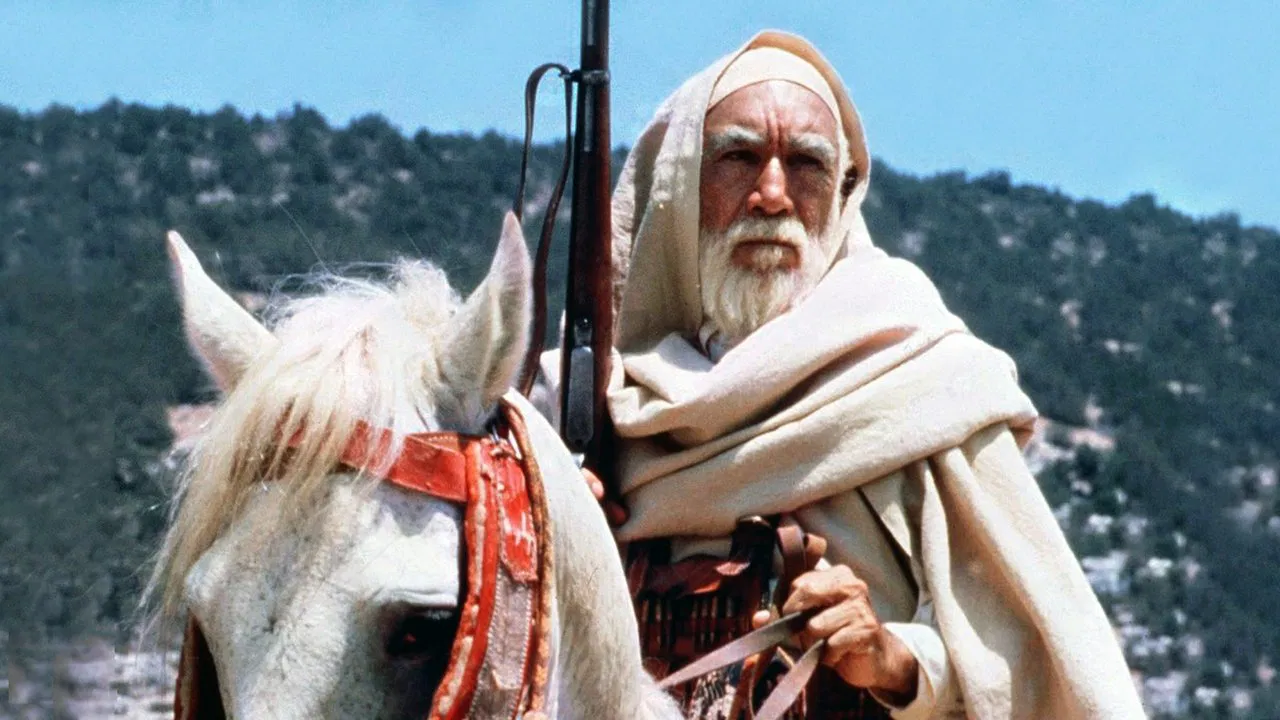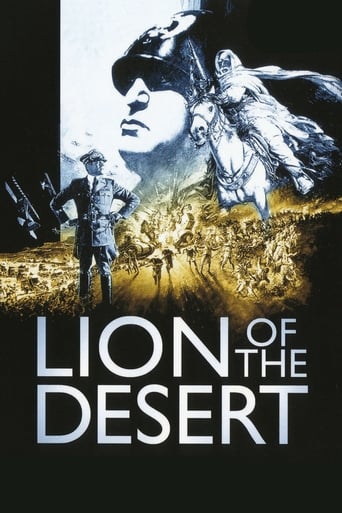

I have a certain degree of fascination with the life of Franco Fantasia. In addition to service in the Italian military during numerous conflicts and having bit parts in B-movies over the course of the following 5 decades, he made a great career for himself serving as a technical, military, and weapon adviser on almost every notable film made in Southern Europe. In this film he plays the Governor General following and advising a character who must have been a colleague of his in his military days, a quite menacing portrayal of General Rodolfo Graziano by the infamous unstable drunkard Oliver Reed.I count this among the many interesting aspects of the story of this film's production, along with the cooperation of the Italian armed forces (with subsequent banning in Italy for "dishonor to the Italian Military") and film industry (nice to see many Cinecitta B-movie veterans like Stefano Patrizi, Adolfo Lastretti, Tom Felleghy, etc. sharing scenes with big Hollywood talent such as Rod Steiger and John Gielgud) and the conspicuous involvement of the Qaddafi regime in funding this film. Director Moustapha Akkad had quite a storied career himself, being the only director daring enough to bring the story of the origins of Islam to the Western World with his previous film THE MESSAGE as well as play a central role in establishing John Carpenter and financing the HALLOWEEN franchise. All these elements feel like they couldn't possibly share the same space, but here they do and the results are surprisingly captivating in a way hearkening back to the best works of David Lean.To Western audiences, this film tells the otherwise cinematically untold story of a completely untaught war, that is the pacification of Libya by the Italian Army between World Wars 1 and 2. It meant the first large- scale use of concentration camps, modern technology including tanks, planes, and poison gas against completely overmatched rebels, and nearly genocidal repression of the existing Libyan population. Films like this need to be shown in schools to give history a life and faces to the facts and to make sure that these atrocities are properly learned from in future Western dealings with the Middle East. I personally applaud Moustapha Akkad and everything he stood for in trying to bridge the gap between cultures, and find it supremely tragic that it proved to be his eventual undoing. This film being such a financial failure trashed his directorial ambitions until 25 years later when he was killed in Jordan by terrorists while location scouting for a new and quite sadly unmade historical epic to focus on Saladin.Akkad loved the testosterone-laden approach to cinema, and here approaches historical cinema with all the enthusiasm of a small boy playing with thousands of army men in a giant sandbox. Unusually for historical epics, this film focuses very heavily on battles and little on personal drama and relationships, making it quite accessible for ADD Westerners such as myself and is authentic enough to history, pouring millions into tanks, uniforms, sets, etc. to the point that history buffs will get a kick out of it. Anthony Quinn really solidly displays some of his finest late-career talent in the role of Omar Mukhtar, the aging leader of the Senussi rebellion in Libya but unfortunately he's surrounded by a lot of poor casting choices for his fellow Libyans. Almost all are played by Europeans (Robert Brown, Andew Keir, John Gielgud, etc.) in bad makeup with the exception of criminally underused Takis Emmanuel.I personally prefer Akkad's directing style over David Lean in terms of action scenes and the adequate level of coverage. Two major highlights: the attack on an Italian caravan in the mountains and following artillery barrage (destroying much of the Libyan landscape) as well as the Italian assault on Kufra. Both scenes contain some surprisingly large level of production values including thousands of uniformed extras and no shortage of carnage, pyrotechnics, breathtaking special effects, and stuntwork. While there's maybe a few battles too many and the film suffers from overlength, it never sags and manages to impressively play both sides of the conflict in a fairly objective manner.This is not a perfect film, but among the historical epic category, a LION OF THE DESERT wins out as a top-shelf favorite film which accomplishes everything it sets out to do.
... View MoreI'm not questioning the math of it, that part's quite clear. No, why did this not get more attention? Perhaps too few know the history, which I must admit that I, myself, was unaware of, though it feels quite authentic. It could be the violence... this is rather brutal, and there are those that would call it downright distasteful. Personally, I call it "realistic" and "not unnecessarily toned down". War is not pleasant, much less glamorous. That is a myth, perpetrated by those who wish to keep it going, the people who benefit. This gives an accurate depiction of the fighting, for both sides. Regardless of the reason, I hope that this film is no longer overlooked. Akkad directed three times, and I've now seen, and rated perfect 10's, two of them, the one remaining being an Arabic version of Mohammad: Messenger of God, which was in English. I don't know what kept him out of the chair apart from these instances, but I hope he felt he had told all that he had in him, for it would be a true shame if he did not get the chance to. The plot is incredible, and genuinely inspirational. Writing, all the way, is excellent, the credible characters with proper motivation, the memorable and quotable dialog, and the script as a whole, all amazing. The music is an epic, orchestral score. All of the effects and action are impeccable. The acting performances are beyond reproach. While this does, off course, hold some bias, I never felt manipulated or lied to, as I watched it. Instead, I was engaged and experienced a recreation of the past, and a portion of it that should not be forgotten. In spite of the listing here on the site, the cut I saw was 153 minutes, or about two and a half hours, long. There is no sexuality or language in this. The DVD comes with a theatrical trailer and a making of, produced around the same time as the feature, and they are good and well-done with that in mind. I recommend this to anyone who believes they can stomach the gruesome visuals that are found(I maintain that the use, and amount, are not gratuitous) in it. 10/10
... View MoreThe second (follwing Mohammed, Messenger of God) of producer turned director Moustapha Akkad's rather foolhardy attempts to create a popular Islamic cinema using Western cinematic and narrative forms which were 20 years (at least) out of date even in Hollywood, Lion of the Desert tells the story of the 20 year campaign of resistance against Italian imperialist occupation by the Bedouin desert armies of Omar Mukhtar. Anthony Quinn, who was also in Mohammed, play Mukhtar as someone's kindly old uncle, a wily old desert lion with one spectacled eye on the Koran and the other on the field of battle. Oliver Reed plays his nemesis, the Italian fascist General Rodolfo Graziani.The film is a fairly simplistic affair. Mukhtar and his fellow Bedouin are the personifications of good, patiently and relentlessly opposing the mechanistic might of the Italians. It's horses and guns versus tanks and bombs for the most part, and the film makes no bones about being propaganda for Mukhtar's resistance movement - not too difficult to swallow, considering the army he was facing. Yet in creating such a black and white view of reality (reminiscent of the many popular films the allies produced during and after the 2nd World War), the film comes across as dated, unambiguous and conceptually crude. The society that Mukhtar was defending is not questioned, even though it is clearly a society which is relentlessly anti-modern and in which women have very little active role to play. There is an intriguing scene in which a grieving war widow brings her son to Mukhtar's tent, and the old lion gives the boy his father's book and instructs him to "tell your mother to keep it safe for you." The woman must be told by the man, even when the man is her tiny child...The film is pretty successful in cramming a long historical story into two and a half hours of screen time, and the narrative is pretty clear. H.A.L Craig's screenplay makes rather too much use of repetitive motifs, which don't develop as the story goes on but simply come up again and again at intervals. The two most notable of these motifs are the constant encounters with "good" Italians who although they wear a fascist uniform shrink from the more abhorrent crimes they are asked to perform and have a scarcely hidden admiration for Mukhtar (exemplified by Raf Vallone's veteran negotiator), and Bedouin children in jeopardy but learning from the "spirit of Mukhtar" - this latter strand of motif leans towards the cloying and sentimental.There is a lot to admire in the film as an achievement in big-scale movie-making. The camera-work is excellent throughout, the battle sequences impressive and certain set-pieces (the montage of the concentration camps the Italians put the Bedouin in; the hanging of Mukhtar) are impressive and worth watching the film for. The performances are pretty ripe, except for Quinn, who over-eggs his pudding by being too kindly, too scholastic, too intrinsically good to convince as a real human being. We expect Reed to be hammy, but he is large without being absurd, and predictably outdone by Steiger doing a shouting turn as Mussolini (a role he also played in 1974's Mussolini: Ultimo atto). Far worse is the tendency to cast veteran British Thespians as elder Arabs: Andrew Keir just about gets away with it, but John Gielgud as a wily old collaborator with the Italians is preposterous, with his rich upper class English tones and pale skin.There's a certain pan-historical element to the story - the Bedouin stand for all colonised peoples fighting their colonisers; this is made explicit in the film by Mussolini comparing the wall Graziani builds with Hadrian's, and one gets the feeling watching the film that it could be inspirational to the oppressed people of Palestine now. Mukhtar, with his high ideals and refusal to torture or kill prisoners, is a very different Muslim fighter to the popular Western image of the suicide bomber today, which only makes director Akkad's death in 2005 in Amman, Jordan by an Al-Qaeda suicide bomber the more bitter and tragic.
... View MoreThe movie, although not a masterpiece, is quite realistic and historically accurate, actually it shows only a very small part of the ruthless brutality used by General Graziani against the civilian population. Some 120.000 civilians were killed in concentration camps in the attempt to quench the resistance. Graziani served only 2 years imprisonment for his crimes after the fall of Fascism, and later became honorary president of the (legal) neo-fascist party. This movie is still banned in Italy, and still recently the Italian Secret Services have prevented its official projection. The majority of Italians, even the anti-fascists, are still persuaded that our troops went to Lybia to build roads hospitals and bridges. It should not surprise that recently the former Prime Minister Berlusconi said that Mussolini never did any harm to anybody - probably not considering some hundred thousands Lybians casualties. Italians love to imagine their soldiers fraternizing with the locals and helping farmers in the fields - sadly the reality of war is quite different.
... View More